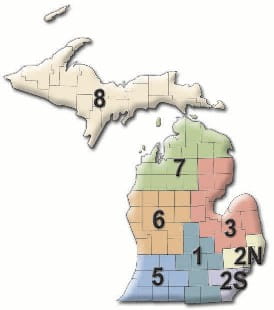The web Browser you are currently using is unsupported, and some features of this site may not work as intended. Please update to a modern browser such as Chrome, Firefox or Edge to experience all features Michigan.gov has to offer.
Home Health Care Disaster Planning Resources
Regulations and Requirements
Regional and Local Contact Information
To the right, you will find a map of the 8 regional healthcare coalitions. Identify in which county your facility resides to determine your designated region. 
-
Region 1: Clinton, Eaton, Gratiot, Hillsdale, Ingham, Jackson, Lenawee, Livingston, and Shiawassee Counties
-
Region 2N: Oakland, Macomb, and St. Clair Counties
-
Region 2S: City of Detroit; Monroe, Washtenaw, and Wayne Counties
-
Region 3: Saginaw, Alcona, Iosco, Ogemaw, Oscoda, Arenac, Gladwin, Midland, Bay, Genessee, Tuscola, Lapeer, Sanilac, and Huron Counties
-
Region 5: Allegan, Barry, Calhoun, Branch, St. Joseph, Cass, Berrien, Van Buren, and Kalamazoo Counties
-
Region 6: Clare, Ionia, Isabella, Kent, Lake, Mason, Mecosta, Montcalm, Muskegon, Newaygo, Oceana, Osceola, and Ottawa Counties
-
Region 7: Manistee, Wexford, Missaukee, Roscommon, Benzie, Leelanau, Grand Traverse, Kalkaska, Crawford, Antrim, Otsego, Montmorency, Alpena, Presque Ilse, Cheboygan, Emmet, and Charlevoix Counties
-
Region 8: Chippewa, Mackinac, Luce, Schoolcraft, Delta, Alger, Marquette, Dickinson, Menominee, Baraga, Iron, Gogebic, Ontonagon, Houghton, and Keweenaw Counties
Each regional healthcare coalition has a Regional Coordinator that manages the ASPR cooperative agreement for healthcare preparedness activities. Each county has a local Emergency Manager who is responsible for assessing and measuring a local jurisdiction's capability to mitigate against, prepare for, respond to, and recover from emergency and disaster events. At each of the local public health departments, there is a full-time Emergency Preparedness Coordinator who manages the CDC cooperative agreement activities for their jurisdiction.